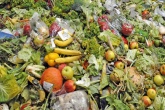Co-op commits to 100 per cent recyclable plastic packaging
The Co-op has committed to making 100 per cent of its own-brand packaging recyclable after a motion was passed with overwhelming support from members at the Co-op Annual General Meeting on Saturday (20 May).
The motion was passed, with an interim target of 80 per cent recyclability to be achieved by 2020, at the AGM in Manchester alongside commitments to tackle modern slavery and to source £2.5 billion worth of products from UK farms over the next three years.
 The Co-op has long sought to reduce its plastic packaging waste, introducing polythene as opposed to polypropylene plastic packaging for its own-brand onions back in 2012, while plastic carrier bags provided in stores are made from Novamont’s MATER-BI bioplastic, which is biodegradable and compostable and can be used as liners in food waste caddies.
The Co-op has long sought to reduce its plastic packaging waste, introducing polythene as opposed to polypropylene plastic packaging for its own-brand onions back in 2012, while plastic carrier bags provided in stores are made from Novamont’s MATER-BI bioplastic, which is biodegradable and compostable and can be used as liners in food waste caddies.
In addition to making its own packaging recyclable, the motion – which was passed with 99.05 per cent of the AGM vote, pledged to ‘work with people across the industry to seek better ways to package food and maximise the amount of packaging handled by recycling facilities in the UK’ and ‘inform and guide shoppers about the positives and challenges behind recycling’.
Last month the supermarket announced that it would be replacing polystyrene bases for its pizza packaging with recyclable cardboard, which it estimates will prevent 200 tonnes of polystyrene going to landfill and create almost 450 tonnes of cardboard for recycling a year.
Commenting on the motions, Co-op Chair Allan Leighton said: “The commitments we’ve made today to help fight modern slavery, cut packaging waste and back British suppliers are what the Co-op is all about. Working closely with our members, colleagues and communities I am confident that we can continue to champion a better way of doing business.”
Time to step up
In addition to these commitments, the UK retailer is considering releasing data on its food waste following the release of a report by Parliament’s Environment, Food and Rural Affairs (EFRA) Committee last month (30 April) calling on supermarkets to do more to improve packaging and report on food waste data to improve transparency after stating that current approaches were ‘inadequate’.
Focus on retailer food waste has been sharpened in recent weeks following the release of the report. Currently, only two supermarkets publish their food waste figures, with Sainsbury’s joining Tesco in doing so in September 2016. Tesco CEO Dave Lewis had previously called for other supermarkets to step up and publish their figures in June of last year.
Retailers are also pushing forward with food redistribution schemes to send unused food to local charities to ensure it does not go to waste, with Tesco announcing at the start of last week (15 May) that the amount of food it redistributed to community schemes in 2016/17 rose by 148 per cent to 5,700 tonnes, while Marks and Spencer unveiled plans to include chilled food in its nationwide food redistribution scheme, a notoriously difficult but welcome move.
The Co-op itself works with FareShare, a UK food redistribution charity, to send surplus food to charities and community groups, while in 2013 the retailer relaxed its rules on ‘wonky’ fruit and veg, allowing smaller or misshapen yet still tasty produce onto its shelves. 










